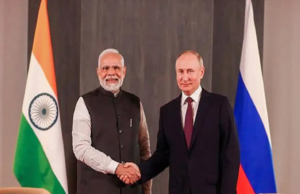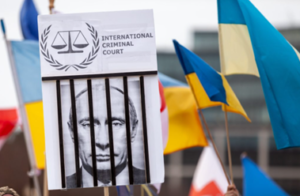Russian President Vladimir Putin not to attend New Delhi G20 summit.
Relevance
- GS Paper 2 Bilateral, regional and global groupings and agreements involving India and/or affecting India’s interests.
- Effect of policies and politics of developed and developing countries on India’s interests, Indian diaspora.
- Tags: #Russia #putin #india #internationalrealtions #G20 #currentaffairs #upsc
Why in the News?
Russian President Vladimir Putin not to attend New Delhi G20 summit.
Putin’s Absence Continues at International Summits Post Ukraine Crisis
- This isn’t the first time Putin has chosen not to attend such gatherings. He was notably absent from last year’s G20 summit in Bali.
- He was also not present in the recent 15th BRICS summit in Johannesburg. On both occasions, Russian Foreign Minister Sergey Lavrov led the national delegation.
- This absence aligns with Putin’s pattern of non-participation in international summits since the start of the Ukraine crisis in February 2022.
- Even his anticipated visit to Turkey, upon the invitation of President Recep Tayyip Erdogan, now hangs in the balance due to this announcement.
Why is Putin not attending G20 SUMMIT?
- Focusing on Military Operation in Ukraine: Dmitry Peskov explained that Putin will not be traveling to India for the G20 summit, citing the current priority of the special military operation in Ukraine.
- He risks arrest if he travels abroad, as the International Criminal Court (ICC) has issued an arrest warrant for him accusing him of war crimes in Ukraine.
- Political Calculations and Domestic Considerations public sentiment and opinions within Russia might impact whether Putin attends international events during times of crisis.
- Putin’s decision to skip G20 summits is likely influenced by a combination of strategic, diplomatic, and political considerations that are unique to Russia’s current international context.
Repercussions on India’s Russia relations
As of now, there has been no official response from the Ministry of External Affairs regarding Dmitry Peskov’s statements on Putin’s absence from the G20 summit.
- Symbolic Significance: Putin’s absence might be seen as a missed chance to demonstrate unity and collaboration between the two countries on a global stage, given India’s role as the host.
- Perception of Priorities: Russia’s absence might raise questions about its commitment to India, potentially impacting public sentiment and the perception of the “all-weather friends” relationship.
- Soft Power and Diplomacy: Personal interactions between leaders contribute to the soft power of international relations. Putin’s absence might impact this aspect.
However the absence of Putin from the G20 summit is unlikely to significantly impact India-Russia relations. Both countries comprehend each other’s political circumstances, mitigating potential repercussions.
What led to the ICC issuing an arrest warrant for Putin?
The ICC issued an arrest warrant for Russian President Vladimir Putin due to allegations of war crimes related to the unauthorized deportation and transfer of children from occupied Ukrainian regions to Russia.
Does the ICC possess the authority to prosecute Russia?
- As of March 2023, Russia has not ratified the Rome Statute, rendering the ICC devoid of jurisdiction over offenses committed within its borders. Nevertheless, the ICC retains the ability to probe and bring charges against individuals from other nations who purportedly committed crimes within the territory of a state that is a party to the Rome Statute.
- Moreover, even though Ukraine is not a State Party to the Rome Statute, it has twice chosen to accept the ICC’s jurisdiction over alleged offenses under the Rome Statute occurring on its soil, as outlined in Article 12(3) of the Statute.
USA Russia tussle
- The war in Ukraine: The war is likely to drag on for months or even years, and it will continue to strain relations between the US and Russia.
- The sanctions: The sanctions imposed on Russia are the toughest ever imposed on a country. They are having a significant impact on the Russian economy, and they are likely to remain in place for the foreseeable future.
- The arms race: The war in Ukraine has led to a new arms race between the US and Russia. Both countries are developing new weapons systems, and they are increasing their military spending.
- The rise of China: China is emerging as a major power, and it is challenging the US for dominance in the world. This is likely to further complicate the US-Russia relationship.
President Vladimir Putin’s decision to forego the G20 summit in India underscores the ongoing prioritization of the military operation in Ukraine. While this absence has led to uncertainty and questions, the strong and lasting friendship between India and Russia remains a constant. Diplomatic ties between the two nations are expected to prevail, demonstrating that India and Russia are friends forever.
| International Criminal Court (ICC)
Purpose: ICC is the sole permanent international criminal tribunal. Background: Established by the 1998 Rome Statute, it commenced operations on July 1, 2002, upon the Statute’s enactment. Mandate: Investigates and prosecutes individuals charged with grave international crimes: genocide, war crimes, crimes against humanity, and aggression. Location: Based in Hague, Netherlands. Membership: 123 nations are States Parties recognizing ICC’s jurisdiction. Exceptions include the US, China, Russia, and India. Funding: Supported by States Parties’ contributions and voluntary donations from governments, organizations, individuals, and corporations. Structure: ·Judges: 18 judges from different nations, serving nonrenewable nine-year terms. ·Presidency: Comprises the President and two Vice-Presidents, representing the Court externally and aiding judicial organization. ·Divisions: 3 divisions – Pre-Trial, Trial, and Appeals – with 18 judges in total. ·Office of the Prosecutor (OTP): Investigates referred crimes and conducts prosecutions before the Court. Registry: Provides administrative and operational support to Chambers and the Prosecutor’s Office. Jurisdiction: ·ICC handles individual prosecutions, not state disputes like the International Court of Justice. ·ICC has jurisdiction if the crime occurred in a State Party to the Rome Statute or if the perpetrator’s nation is a State Party. ·ICC steps in when national courts can’t or won’t address the case. ·Jurisdiction applies to crimes committed after the Statute’s enactment in July 2002. Relation with UN: ·ICC isn’t a UN agency but has a cooperation agreement with the UN. ·UN Security Council can grant ICC jurisdiction by referring situations beyond its purview. |
Sources: Livemint
Mains Question
“Analyzing the Implications of Russian President Vladimir Putin’s Absence from the G20 Summit in India in the Context of Geopolitical Dynamics: Discuss the Factors Influencing Putin’s Decision, Regional Engagements, and the Resilience of India-Russia Relations.” 250words.





